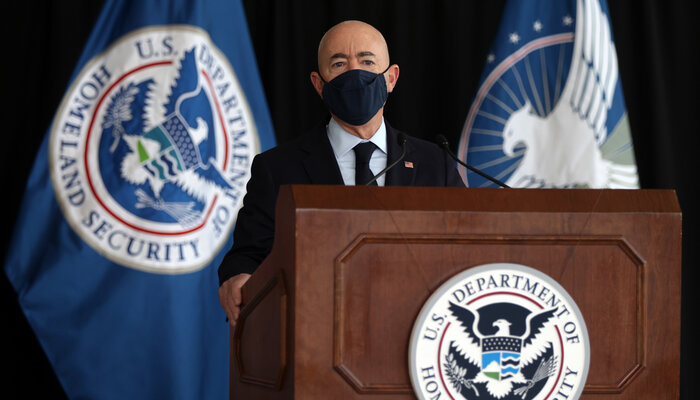This article was first published at Just Security.
Senator Ron Wyden (D-OR) recently revealed that, over the past two years, Homeland Security Investigations (HSI) – the law enforcement arm of the Department of Homeland Security’s Immigration and Customs Enforcement unit – conducted an “indiscriminate” surveillance dragnet that swept up some six million money transfers between people in Mexico and four southwestern states. Wyden called on the DHS inspector general to investigate the surveillance. That’s a critical step – the program’s bulk collection of information was clearly an abuse of power, targeted at the Latino community. But the problems at HSI go much deeper. The money transfer dragnet is only the latest overreach by a department that’s long overdue for systemic reform.
HSI, which has rarely been in the spotlight, takes an expansive view of its mandate to combat transnational crime. It uses this authority to start criminal investigations into ordinary financial transactions, travel, and family relationships. These can have drastic consequences, from criminal charges to deportation, for those targeted.
In the case of the money transfers, HSI demanded that companies like Western Union provide sender and recipient names, addresses, and transaction amounts on all money transfers over $500 entering or leaving Arizona, California, New Mexico, Texas, and Mexico. The legal tool used was an administrative subpoena, which is not approved by a court and is only supposed to be used to seek information needed for an active customs investigation – a requirement that Wyden notes doesn’t seem to have been met. The agency has not claimed (nor could it credibly argue) that all of these transactions were part of an active investigation. On the contrary, HSI appears to have sought and saved the data for its agents – and other local, state, and federal officers with whom it shares information – to trawl through whenever they choose and use in any way they want. This would appear to violate the Fourth Amendment to the U.S. Constitution, which prohibits the government from scooping up information about people in the absence of any suspicion of criminal activity.
This is part of HSI’s pattern. The agency often uses its transnational crime mission to investigate immigrants of color who are not suspected of criminal activity. Starting in 2017, for example, HSI led an operation that targeted the parents and relatives of unaccompanied immigrant children who were entering the United States to reunite with family after fleeing unstable living conditions in their home countries. Although this operation was a blatant attempt to penalize vulnerable children and their families for seeking refuge in the United States, HSI cloaked the operation in language emphasizing transnational criminal organizations, saying it was aimed at human smuggling operations, despite the absence of any focus on smuggling organizations or networks.
Similarly, since at least 2017, HSI has inserted itself into young immigrants’ removal proceedings and applications for immigration relief by producing “HSI memos,” which are used by immigration officials to justify detaining youth without bond and denying them immigration benefits that provide legal residency, like Special Immigrant Juvenile Status and Deferred Action for Childhood Arrivals. As reflected in these memos, HSI uses vague criteria to brand young immigrants as gang members – criteria such as wearing colors or clothing associated with gangs, being present in an area frequented by gangs, or being seen with known gang members.
These types of programs are not just a product of former President Donald Trump’s anti-immigrant agenda. HSI’s Operation Second Look program started during the administration of President Barack Obama. It investigates naturalized citizens, looking for inconsistencies in their documents or old deportation orders as grounds to strip them of citizenship. The program reportedly focuses on immigrants from “special-interest” nations – a list that consists overwhelmingly of countries with substantial Muslim populations.
HSI has also been implicated in invasive airport searches, which activists have alleged are deployed punitively against journalists, activists, and travelers of color – another practice dating back to the Obama administration. HSI uses its expansive border search authority, which is meant to prevent people and items posing an imminent danger from entering or leaving the country, to seize, break into, and copy the contents of travelers’ cell phones, laptops, and other electronic devices.
Finally, for years, particularly under the George W. Bush and Trump administrations, HSI conducted workplace raids and mass arrests of working immigrants. Last year, President Biden’s Secretary of Homeland Security Alejandro Mayorkas ordered an end to this practice, a welcome and important change.
Despite news reporting on these troubling practices, HSI has faced limited oversight. A review of investigation reports made public by DHS’s Inspector General reveals that the office has never investigated HSI’s civil rights and civil liberties record. The lack of investigations isn’t due to lack of expertise: the Office of Inspector General routinely conducts these types of reviews into how Enforcement and Removal Operations – ICE’s other half – treats detainees. DHS’s Office for Civil Rights and Civil Liberties also does not seem to have reviewed HSI’s operations, although not every review by that office is made public.
Urgent action is needed to rein in this part of DHS that has too much power and is subject to too little oversight. Mayorkas should issue a clear directive pausing HSI’s initiatives that are alleged to involve civil rights and civil liberties abuses and commission an independent review of HSI’s authorities and operations. Increased oversight, stronger protections against profiling, and concrete consequences for civil rights and civil liberties violations should be the starting point, not the end, of forward-looking reforms.






